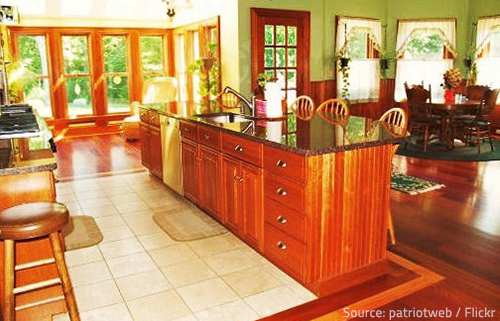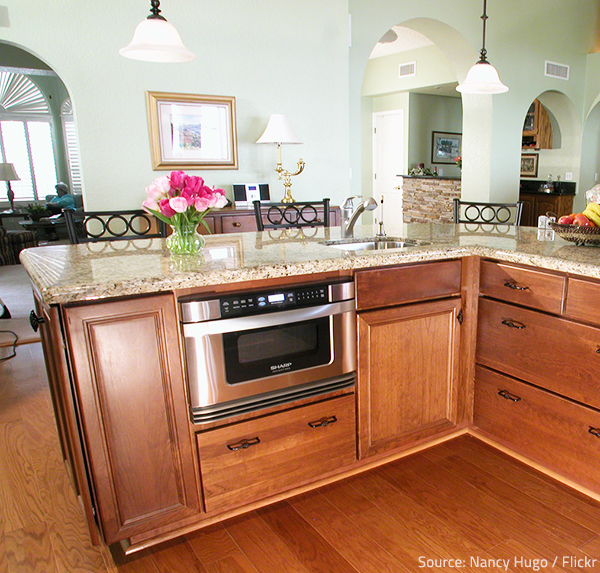Is Granite Environmentally Friendly?
In our age of increasing environmental awareness, more and more people are considering the use of eco-friendly materials in their home designs.

Your green kitchen will add life and vibrancy to your home design.
It is just a small step in the right direction – such as recycling and composting, energy and water conservation, etc. – but it will still result in a greener and more sustainable lifestyle and will help reduce the negative impact of industrial activities on the environment.
So, when designing a new home or remodeling your living space, you may want to go green as well and use environmentally friendly materials in your new interior décor. However, you will also probably want the most beautiful and practical materials available on the market.
Fortunately, there is no need to sacrifice beauty for the sake of environmental responsibility as many sophisticated, high-end materials are in fact “green” too. Natural stones – and granite, in particular – are among your most elegant and most eco-friendly options. They not only bring warmth and natural beauty to the ambience, but can also last for many decades, thereby saving resourcesResources include tools, personnel, equipment, and materials... More and reducing the environmental impact of mining and processing operations.
But is granite eco-friendly indeed? How does it affect the environment?
What Is The Environmental Impact Of The Granite Industry?
When thinking about how a certain material affects the environment, keep in mind that its environmental impact begins long before it is installed in your home and will continue after you dispose of it. Here is what you need to consider when looking for a green material:
- Origin: The most eco-friendly materials are those that are renewable or come from recycled products. Natural stones are neither, so granite doesn’t rank as a green material by this criterion;
- Manufacturing process: Materials that require less processing use less energy and, therefore, have less impact on the environment. Natural stones, however, must be quarried which is a high energy and water intensive process. So, considering the environmental effects of granite mining, the beautiful stone cannot be classified as an eco-friendly product;

Granite mining has a considerable impact on the environment.
- Transportation: Transport can also be environmentally detrimental – if the stone needs to be shipped a great distance, a lot of fuel will be consumed in the process and the resulting large emissions of sulfur dioxide, nitrogen oxides, and carbon monoxide will contribute to the air pollutionPollution is the introduction of harmful substances into the... More. Therefore, your greenest option is to use local materials from within a 500-mile radius in order to reduce air pollutionPollution is the introduction of harmful substances into the... More. This makes granite environmentally preferable in states like New Hampshire where it is quarried;
- Installation: The installation process is likely to result in plenty of dust, VOCs, and other chemicals from adhesives and compromise the safety of your living environment. Using low-toxicity binders and other naturally occurring materials during the installation can minimize this negative effect. Granite can be installed with the help of low-odor acetone and silicon – both of which are considered eco-friendly, so the process is as green as it gets.
Are Granite Countertops Eco-Friendly?
Considering all of the above, granite countertops can hardly be called environmentally friendly countertops. There are other important factors, however, which tip the scales in favor of the popular natural stone:
Maintenance
Cleaning products that contain harsh chemicals have quite a negative effect on the environment (and especially on your indoor air qualityIndoor air quality (IAQ) refers to the condition of the air ... More), so materials that can be kept clean and hygienic without any need of strong cleaning agents are considered to be greener.
Granite tops the list of easy-to-maintain household materials – all you need to do to keep it in pristine condition is wipe the surfaces with water and mild soap. Properly sealed granite countertops are extremely hygienic (the sealed surface does not harbor bacteria growth) and do not accumulate dust and dirt easily, so maintenanceMaintenance is the routine care, inspection, and repair of a... More is a breeze and does not require any chemicals. This makes the counters eco-friendly.

Your beautiful granite countertops can last for decades when properly cared for.
Durability
The lifespan of a material is one of the major factors determining its “greenness” – after all, if you never have to replace it, it’s definitely the most eco-friendly option.
Granite countertops can easily last a lifetime when properly cared for – they are extremely strong and durable, scratch- and stain-resistant when sealed well, and easy to revive or refurbish when necessary. This fact alone is enough to rank granite counters among the most eco-friendly countertops available (rivaled only by quartz).
End of life
All materials that can be recycled, reconditioned, and reused when disposed of are considered to be green as reprocessing helps preserve natural resourcesResources include tools, personnel, equipment, and materials... More, avoid the extraction impacts of mining, and keep harmful chemicals out of the environment. When you discard your granite countertop, the stone can be downcycled into smaller slabs for other applications, so the material can be said to be eco-friendly by this criterion.
Last but not least, granite countertops will not emit VOCs, formaldehyde, or radonRadon is a naturally occurring radioactive gas that can accu... More, so they are products with high indoor air qualityIndoor air quality (IAQ) refers to the condition of the air ... More value.
All in all, when it comes to the environmental impact of granite countertops, you can rest assured that using the beautiful natural stone in your interior design is a safe and green option – especially, if you make sure the manufacturers you order your new counters from are conscientious about their work.












